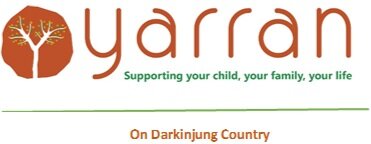What is Early Childhood Intervention?
Yarran is an early childhood intervention service supporting children from birth to eight years.
What is early childhood intervention?
Early Childhood Intervention Services support children with a disability or developmental delay from birth to school entry, and their families.
These services build on opportunities for learning and development that are provided at home, preschool child care, playgroups, community activities and the first two years at school.
Early Childhood Intervention Services recognise that families are children's first and most influential teachers. Families are the primary influence on children's learning and development
The overall aim of services is to provide parents and families with the knowledge, skills and support to meet the changing needs of their child and to optimise the child's development and ability to be part of family and community life.
What do Early Childhood Intervention Services provide?
Early Childhood Intervention Services provide a range of specialist services for families with children who have a disability or developmental delay, prior to school entry.
The range of specialist services may include:
Information and advice that addresses the individual needs of the child and family.
Supporting families to help their child's development.
Linking families to services and providing access and coordination of services such as family support services.
Education ,therapy and developmental programs.
Additional support to improve access and participation in kindergarten and child care, preschool services.
Assisting with the transition to school.
Therapy support programs.
Reference: Victorian Department of Education and Early Childhood Development.
Extracts from Supporting Young Children and their Families Early to reach their Full Potential Consultation paper.
What is Early Childhood Intervention?
Early childhood intervention is the extra support given to young children who need it, early in their life, to help them build their skills so they can take part in everyday activities.
It is especially beneficial for young children who are susceptible to, or experiencing, developmental delay or disability.
It also provides parents and families with knowledge, skills and specialist supports to meet the needs of their child, optimise child development, and participate in family and community life.
What is Evidence Based Best Practice?
International research and evidence show us young children and families gain the best outcomes if the support and services delivered include:
The family’s intimate knowledge and understanding of their child, and the central role they play in the child’s life.
The familiarity of home and community settings to deliver therapy and support, using play, learning, routines, and natural interactions.
The collaboration of family members, friends, carers, educators, therapists, and providers working together as a team and sharing their knowledge and experience.
Built knowledge and understanding of family members, friends, teachers, and therapists who spend the most time with the child and have the greatest impact on their development.
Customisation and respect of cultural, language, social and family values and beliefs.
Practice of meaningful involvement of children in family, home, and community settings.
Appropriately qualified professionals who deliver high quality, consistent, evidence based best practices.
Celebration and support of families and children to reach goals, milestones, and achievements.
